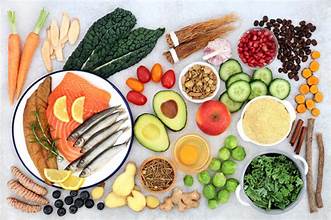Exploring the realm of Anti-inflammatory lifestyle diet and daily habits, this introduction sets the stage for a comprehensive journey into the significance of adopting such practices for overall well-being. Dive into a world where simple dietary choices and daily routines can make a profound impact on chronic inflammation and pave the way for a healthier lifestyle.
Introduction to Anti-inflammatory lifestyle diet and daily habits
An anti-inflammatory lifestyle focuses on making dietary and lifestyle choices that help reduce inflammation in the body. Chronic inflammation is linked to various health issues, including heart disease, diabetes, and autoimmune disorders. By adopting an anti-inflammatory diet and habits, individuals can improve their overall health and well-being.Importance of Anti-inflammatory Choices
- Eating a diet rich in fruits, vegetables, whole grains, and healthy fats can help reduce inflammation in the body.
- Avoiding processed foods, sugary drinks, and excessive alcohol consumption can also play a role in reducing inflammation.
- Incorporating regular physical activity, stress management techniques, and sufficient sleep are essential components of an anti-inflammatory lifestyle.
Impact on Chronic Inflammation
- Studies have shown that adopting an anti-inflammatory diet can lead to lower levels of inflammatory markers in the body.
- Reducing chronic inflammation can help lower the risk of developing chronic diseases and improve overall health outcomes.
- Small changes in daily habits, such as choosing whole foods over processed foods, can have a significant impact on reducing inflammation over time.
Anti-inflammatory Foods
Including anti-inflammatory foods in your diet can help reduce inflammation in the body and promote overall health. Here are some common anti-inflammatory foods:Berries
- Blueberries
- Strawberries
- Raspberries
- Blackberries
Fatty Fish
- Salmon
- Mackerel
- Sardines
- Trout
Leafy Greens
- Spinach
- Kale
- Swiss chard
- Collard greens
Nuts
- Almonds
- Walnuts
- Pecans
- Hazelnuts
Herbs and Spices
- Turmeric: Contains curcumin, a potent anti-inflammatory compound.
- Ginger: Known for its anti-inflammatory and antioxidant properties.
- Cinnamon: Helps reduce inflammation and improve insulin sensitivity.
- Garlic: Contains sulfur compounds that have anti-inflammatory effects.
Daily Habits for Reducing Inflammation
Regular physical activity plays a crucial role in combating inflammation by promoting circulation, reducing oxidative stress, and supporting overall immune function. Exercise can help decrease levels of inflammatory markers in the body, leading to a lower risk of chronic inflammation-related diseases.Significance of Regular Physical Activity
- Engaging in aerobic exercises like walking, jogging, or swimming for at least 30 minutes a day can help reduce inflammation.
- Incorporating strength training exercises can also improve muscle mass and metabolism, contributing to a healthier inflammatory response.
- Consistency is key - aim for at least 150 minutes of moderate-intensity exercise per week to reap the anti-inflammatory benefits.
Importance of Stress Management Techniques
- Stress management techniques such as meditation, deep breathing, and yoga can help lower cortisol levels and reduce inflammation in the body.
- Practicing mindfulness and relaxation techniques regularly can improve overall well-being and support a healthy inflammatory response.
- Take time each day to engage in stress-relieving activities to promote a more balanced immune system and reduce inflammation.
Tips for Improving Sleep Quality
- Establish a consistent sleep schedule by going to bed and waking up at the same time each day to regulate circadian rhythms and promote restful sleep.
- Create a relaxing bedtime routine by avoiding screens, caffeine, and heavy meals before bed to improve sleep quality and reduce inflammation.
- Ensure your sleep environment is conducive to rest by keeping the room dark, quiet, and cool for a more restorative night's sleep.
Gut Health and Inflammation
Maintaining a healthy gut is crucial for reducing inflammation in the body. The gut plays a significant role in the immune system and can impact inflammation levels throughout the body.Probiotics and Prebiotics
Probiotics are beneficial bacteria that help maintain a healthy balance in the gut microbiome, while prebiotics are non-digestible fibers that serve as food for these good bacteria. Together, they can help reduce inflammation by promoting a healthy gut environment.- Probiotic-rich foods include yogurt, kefir, kimchi, sauerkraut, and miso. These foods can help replenish good bacteria in the gut and support a healthy immune system.
- Prebiotic foods like garlic, onions, bananas, asparagus, and whole grains provide the necessary fiber for probiotics to thrive and enhance gut health.
Impact on Inflammation
A balanced gut microbiome can help regulate the body's inflammatory response. When the gut is healthy, it can prevent the leakage of toxins into the bloodstream, which can trigger inflammation and immune responses.By incorporating probiotic and prebiotic-rich foods into your diet, you can support a healthy gut microbiome and reduce inflammation in the body.










